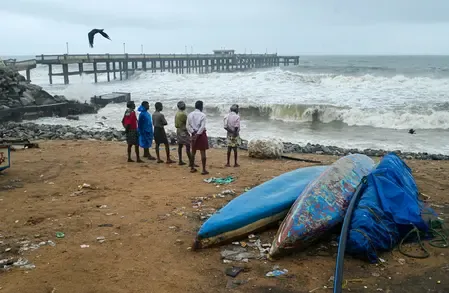Why Were Four TN Fishermen Arrested by the Sri Lankan Navy?

Synopsis
Key Takeaways
- Four fishermen from Tamil Nadu arrested by Sri Lankan Navy.
- Accused of breaching the International Maritime Boundary Line (IMBL).
- Seizure of their motorized fishing vessel.
- Growing concerns among fishing communities in Tamil Nadu.
- Call for urgent diplomatic intervention.
Chennai, July 22 (NationPress) The Sri Lankan Navy has detained four Indian fishermen hailing from Tamil Nadu’s Rameswaram, citing allegations of crossing the International Maritime Boundary Line (IMBL) and engaging in illegal fishing within Sri Lankan waters.
The arrests took place during the early morning hours on Tuesday when the fishermen embarked on their typical deep-sea fishing journey aboard their motorized boats.
Local sources indicate that the fishermen launched from the Rameswaram fishing harbor and were actively fishing in mid-sea when they were intercepted by Sri Lankan naval personnel conducting patrols in the region.
The navy accused them of violating the International Maritime Boundary Line (IMBL) and conducting fishing operations within the maritime territory of Sri Lanka.
In addition to detaining the fishermen, the Sri Lankan Navy also confiscated their motorized fishing vessel.
Reports suggest that the detainees have been transported to the Mannar Naval Camp in Sri Lanka for further investigation.
This incident reflects a recurring trend, with Sri Lankan authorities ramping up their enforcement against Indian fishermen accused of encroaching into their waters.
The fishermen claim that alongside these arrests, the Sri Lankan government routinely seizes their mechanized boats, many of which are subsequently declared state property.
Such occurrences have sparked increasing concern among fishing communities in Tamil Nadu, particularly in coastal regions like Ramanathapuram, which heavily depend on deep-sea fishing for their economic sustenance.
Fishermen's associations have voiced strong disapproval of the actions taken by the Sri Lankan Navy and are urging both the Central and Tamil Nadu state governments to take swift action.
“There needs to be diplomatic engagement to address this enduring issue. These ongoing arrests jeopardize our lives and livelihoods,” stated John Thomas, a representative of a local fishermen’s union.
As the frequency of these arrests escalates, fishing communities find themselves living in constant fear, while diplomatic negotiations between India and Sri Lanka aimed at a permanent resolution remain unproductive.
The demand for decisive measures to protect Indian fishermen operating near the IMBL is growing increasingly urgent.










